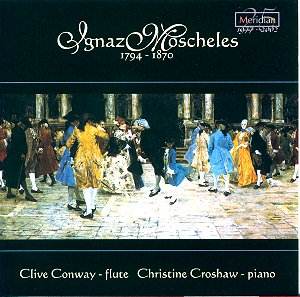Moscheles lived long enough to witness the rise of
Beethoven and Wagner, indeed he championed the former by playing the
Pathétique sonata at the age of ten and at the end of
his life he played the late sonatas Op.109 and 111, a mystery to many
audiences then and since. Moscheles was a virtuoso pianist who toured
the musical centres and capitals of Europe, giving recitals to great
acclaim. He was by all accounts an exemplary technician, who impressed
with his detailed accuracy in what might have been tossed off in a shower
of notes (right and wrong ones) by lesser players. He taught Mendelssohn,
and became Professor of Piano at Leipzigís Conservatorium at his pupilís
invitation in 1846, a post he held for two decades and long after Mendelssohnís
early death. He came to love Chopinís piano music, and was an early
admirer of Schumann, especially the Romantic characteristics of his
music. Moscheles wrote a great deal, his published opus numbers achieving
three figures of which maybe the concertos are best known today, if
on more adventurous record labels alone.
Meridianís disc mixes solo piano music with that for
flute and piano accompaniment, and the variety is a strong plus, not
only of the instruments but also of the styles in Moschelesí writing.
The Gigue, for example, casts a backward glance at the Baroque and Bach,
the second of the Four Divertimenti is a charming pastiche of the Austro-Hungarian
National Anthem, treated in much the way Haydn had done years before
in his ĎEmperorí string quartet, while the last of the four is a curious
parody of a Swiss yodelling tune. All tuneful music played expertly
by Christine Croshaw, though the piano sound is occasionally too bright
and brittle, and flautist Clive Conway, a duo who appear elsewhere on
Meridian discs (whose silver jubilee year this has been) as part of
a team of players covering the period with the music of Hummel, Weber
and Czerny.
Christopher Fifield
